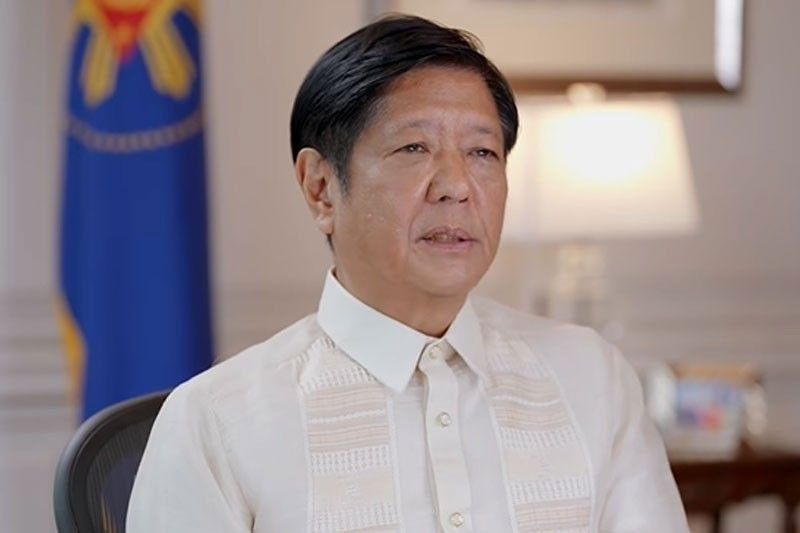President Marcos review of 2025 budget almost done – Palace

MANILA, Philippines — President Marcos is nearly finished with his review of the 2025 national budget, which he is expected to rid of certain provisions, particularly what he deemed were unexplained “insertions” and cuts in some key agencies.
The President is set to sign the proposed P6.352-trillion budget bill for 2025 on Dec. 30.
“Almost done. And the budget message too,” Presidential Communications Office Secretary Cesar Chavez told reporters yesterday when asked for updates on the ongoing review of the General Appropriations Bill (GAB), ratified by Congress on Dec. 11.
The budget message usually contains the President’s explanation of any changes made to the Congress-approved appropriations.
Marcos delayed the enactment of the 2025 spending bill following calls for scrapping of items considered unconstitutional, including the inserted hefty increase in the funding for public works, which was bigger than that for education.
The education sector must be given the highest budget priority under the Constitution. The GAB was initially scheduled to be signed by the President on Dec. 20.
Malacañang has assured the public that the 2025 budget would be compliant with the Constitution.
Executive Secretary Lucas Bersamin on Thursday said the President and his Cabinet would thoroughly review the GAA “with or without the calls... to make them conform to the Constitution, and to see to it that the budget prioritizes the main legacy thrusts of the administration.”
Bersamin said the President has been “most prudent in programming and spending of our limited fiscal resources.”
Marcos’ sister Sen. Imee Marcos was among those who criticized the spending bill passed by Congress.
The senator had pointed out that the P1.113-trillion public works budget was higher than the overall P925-billion allocation for basic, higher and technical vocation education.
The senator, who labeled the proposed budget as “very very bad,” stressed that the public works outlay should be slashed by at least P188 billion to make it compliant with the 1987 Constitution.
Former Senate president Juan Miguel Zubiri had also expressed hope that the concerns over the proposed 2025 budget would be addressed to prevent a possible legal challenge before the Supreme Court that might force a reenactment of the budget.
30 bills
Meanwhile, the quad committee of the House of Representatives will file 30 bills that it considers relevant to its investigations on extrajudicial killings (EJKs) as part of the war on drugs of the Duterte administration, as well as illegal operations of Philippine offshore and gaming operators (POGOs), quad comm chairman and Surigao del Norte Rep. Robert Ace Babers said on Thursday.
In an interview with Teleradyo Serbisyo, Barbers said one of the bills being readied is aimed at strengthening the country’s laws against criminal activities perpetrated by foreigners who manage to illegally obtain Filipino citizenships and buy properties in the country.
Barbers said they have already filed five bills, including House Bill 10986 or an act classifying EJKs as a “heinous crime.”
The quad comm has also filed HB 01987 or an act prohibiting all forms of POGOs in the country, HB 11043 or an act providing for a civil forfeiture in favor of the State any unlawfully acquired real estate properties by any foreign national, HB 11117 or an act providing for administrative cancellation of birth certificates registered through fraudulent means by foreign nationals and HB 10998 or an act punishing conspiracy and proposal to commit espionage.
In the interview, Barbers also lashed out at some groups and individuals who maligned the quad comm.
“It is easy for the critics, especially those who are paid to destroy and create intrigue against the name of quad comm, its co-chairs and members. They do not give attention and importance to the important findings of quad comm, like identifying Filipino and Chinese involved in drug smuggling in our country, Filipinos and foreigners who are giving protection to POGOs and other illegal activities, to the authorities who gave out protection and money to policemen who conducted EJKs that led to the deaths of over 30,000 people who are not given due process and justice,” he said.
“We have plenty of proposed amendments to our existing laws. For example, the PSA Act, the agency tasked to issue endorsement for an individual to have birth certificate. This agency has been widely used by those involved in illegal POGOs,” Barbers said, referring to the Philippine Statistics Authority.
Barbers cited the case of former Bamban, Tarlac mayor Alice Guo, who turned out to be a Chinese national named Guo Hua Ping.
“Many Chinese nationals, who turned out later to be members of criminal syndicates, managed to enter the country using Filipino passports. Some government agencies have been corrupted by these Chinese nationals, who obtained Filipino identity and Philippine passport,” he said.
Organized on Aug. 12, quad comm comprises four committees – dangerous drugs chaired by Barbers, public order and safety chaired by Laguna Rep. Dan Fernandez, human rights by Manila Rep. Benny Abante and public accounts by Abang Lingkod party-list Rep. Joseph Stephen Paduano.
The committees, through quad comm, aim to collectively examine and deliberate on the interrelated and complex issues related to EJKs, POGOs and illegal drugs.
In a 43-page report, the quad comm earlier recommended the filing of case for crimes against humanity against former president Rodrigo Duterte, Senators Bong Go and Ronald dela Rosa and several others.
The five others recommended by the quad comm for prosecution were former PNP chiefs Oscar Albayalde and Debold Sinas, former colonels Royina Garma and Edilberto Leonardo and Palace aide Herminia Espino.
The former president and the others have been recommended for prosecution for violation of Republic Act 9851, or the “Philippine Act on Crimes Against International Humanitarian Law, Genocide and other Crimes against Humanity.”
The law was enacted in 2009, or two years before the Philippines became a signatory to the Rome Statute of the International Criminal Court.
2025 target
Senate President Francis Escudero, for his part, said that while the chamber had passed 72 bills that got enacted, it is determined to pass pending relevant bills upon the resumption of session in January.
Halfway through the third regular session of the 19th Congress, Escudero said the Senate is on track to be in its most productive year, with 72 bills already enacted into law.
“While challenging because of the start of the campaign for the 2025 elections and with the 19th Congress adjourning on June 14, 2025, the Senate will make the most out of its remaining session days to continue giving the people the public service it deserves,” Escudero said.
Escudero said 44 of the bills had been transmitted to the President for his approval, including the 2025 General Appropriations Bill, while seven others are pending action at the bicameral conference committee level.
Under his leadership, Escudero said the Senate was able to focus on its mandate of passing laws that would help the administration achieve its development plans, strengthen Philippine sovereignty, further enhance the viability of the country as an investment destination and improve the lives of many Filipinos.
“We maximized each session day and leveraged every hour, minute and second on the Senate floor. We passed 108 bills in total. Of these, 72 reached the President’s desk and were signed into law, including 11 LEDAC priority measures,” Escudero said.
Escudero said many of these laws were the result of the inquiries conducted by the various committees of the Senate, in aid of legislation.
“Our hearings, probes and exposés did not merely serve dinner-table gossip for the people’s entertainment. These brought to the table a bounty of bills that will fill plates, sustain families and nourish Filipinos for generations to come,” the Senate president said.
One controversial and high profile Senate investigations was on crimes linked to POGOs, including scamming and human trafficking.
Escudero credited the accomplishments of the Senate to his colleagues and all the staff and employees.
“I know that we have spent a lot of time and done much work for the sake of our country and countrymen. And I hope our countrymen will not forget this,” the Senate president said.
“Indeed, in the past year, we weathered typhoons, braved stormy public opinion and navigated choppy political waters. We overcame these challenges because our 23 senators, strengthened by diversity, sharing a common vision and united in purpose, are more than the sum of its parts,” he added.
The enactment of 72 laws from the start of the third regular session on July 23 until the Christmas break on Dec. 18 was a record feat.
In the first regular session, from July 25, 2022, to June 2, 2024, a total of 19 laws were enacted, including the bills approved during the latter part of the 18th Congress.
For the second regular session that ran from July 24, 2023, to last May 24, a total of 54 laws were enacted with five vetoed by President Marcos.
Approved on the third reading by the Senate under his leadership in the third regular session were 108 measures, or seven times more than the combined total of 14 in the first and second regular sessions, according to Escudero.
The Senate also adopted a total of 106 simple resolutions and nine concurrent resolutions in the first half of the third regular session.
“We did not sacrifice quality for quantity, scrutiny for speed nor consensus for expedience in passing these measures. Each bill underwent the crucible of deliberation and debate, carving out the extraneous, the excessive and the unconstitutional,” he said. — Jose Rodel Clapano, Cecille Suerte Felipe
- Latest
- Trending






























